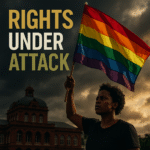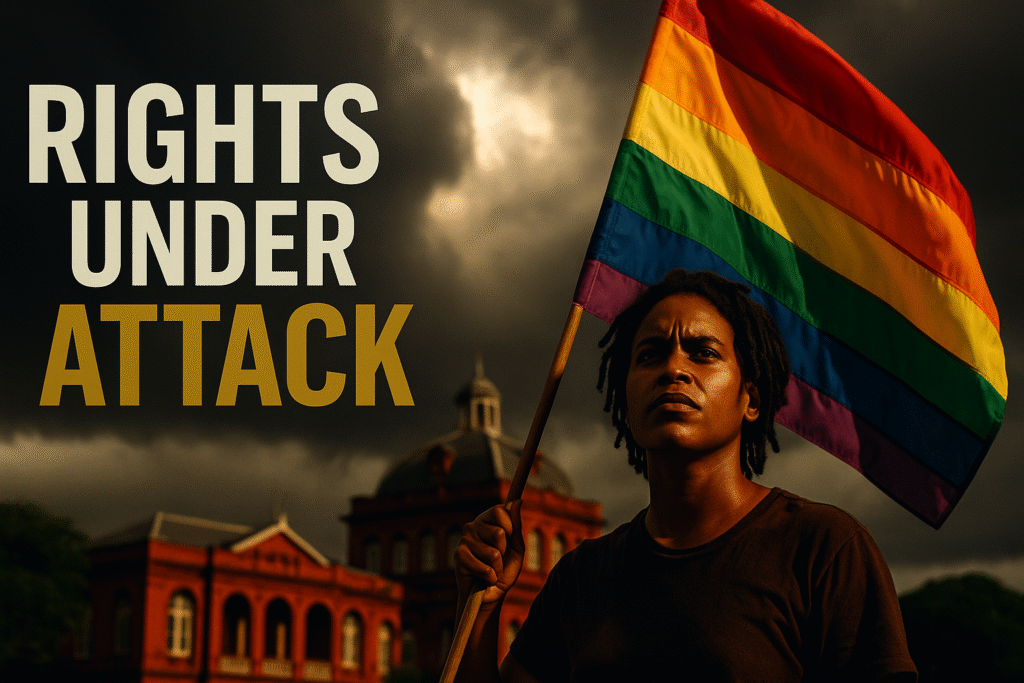

Caribbean LGBTQ+ Rights Under Threat
By Darius Spearman (africanelements)
Support African Elements at patreon.com/africanelements and hear recent news in a single playlist. Additionally, you can gain early access to ad-free video content.
Trinidad and Tobago’s Setback
Trinidad and Tobago recently recriminalized consensual same-sex sexual activity, reversing a 2018 court ruling (washingtonblade.com). This regressive judgment has made LGBTQIA+ citizens of Trinidad and Tobago “unapprehended criminals” in the eyes of the law (washingtonblade.com). This effectively puts a target on the back of LGBTQIA+ people, making them lower-class citizens (thepinknews.com). The recriminalization is rooted in colonial-era laws, specifically Sections 13 and 16 of the Sexual Offenses Act, which criminalize “buggery” and “gross indecency” (thepinknews.com).
The Court of Appeal’s decision to uphold these laws was significantly influenced by a “savings law clause” found in Section 6 of the country’s Constitution (jurist.org). This clause, common in the constitutions of many former British colonies, protects pre-independence laws from legal challenges, even if they conflict with human rights provisions (jurist.org). This means that despite a 2018 High Court ruling that declared these laws unconstitutional, the Court of Appeal reversed this decision, effectively recriminalizing same-sex relations (jurist.org). The mere existence of such legislation creates a climate of fear and vulnerability, impacting the daily lives and safety of LGBTQIA+ individuals (thepinknews.com).
Colonial Legacy and Legal Terms
The laws criminalizing homosexuality in Trinidad and Tobago are remnants of British colonial rule (thepinknews.com). These “buggery” laws were imposed during the colonial era and have persisted in the country’s legal framework even after independence (thepinknews.com). Their continued presence is largely attributed to the “savings law clause” in the Constitution (jurist.org). This clause was originally intended to ensure legal continuity during the transition to independence but has inadvertently become a barrier to human rights progression (jurist.org).
The terms “buggery” and “gross indecency” are legal terms used in these colonial-era laws. “Buggery” typically refers to anal sex, while “gross indecency” is a broader term that can encompass various non-procreative sexual acts. The “savings law clause” protects pre-independence laws from being challenged on human rights grounds (jurist.org). This means that despite modern human rights standards, these historical laws remain in force (jurist.org).
Impact on LGBTQIA+ Individuals
The recriminalization of homosexuality in Trinidad and Tobago has severe practical implications for LGBTQIA+ individuals, effectively labeling them as “unapprehended criminals” (washingtonblade.com). This legal status can lead to increased discrimination, social stigma, and potential harassment (thepinknews.com). The general impact of such laws often includes barriers to employment, housing, and healthcare, as well as heightened risks of violence and psychological distress due to fear of prosecution and societal rejection (thepinknews.com). The ruling is seen as putting “a target on LGBTQIA+ people,” suggesting a direct threat to their safety and well-being (thepinknews.com).
While the frequency of arrests or prosecutions under these laws is not specified, the mere existence of such legislation creates a climate of fear and vulnerability (thepinknews.com). This impacts the daily lives and safety of LGBTQIA+ individuals (thepinknews.com). Being labeled as “unapprehended criminals” and having “a target” on them suggests increased social stigma, which can lead to psychological distress, reluctance to seek healthcare due to fear of discrimination, and potential threats to physical safety within the community (thepinknews.com).
Judicial Process and Appeals
The Judicial Committee of the Privy Council (JCPC) is the final court of appeal for several Commonwealth countries, including Trinidad and Tobago (lens.civicus.org). An appeal to the JCPC is significant because it represents the last legal avenue for challenging the recriminalization of homosexuality in the country (lens.civicus.org). For LGBTQI+ activists, this appeal is crucial for potentially restoring the rights that were previously affirmed by the High Court but then overturned by the Court of Appeal (lens.civicus.org).
The JCPC’s decision would be binding and could set a precedent for human rights in Trinidad and Tobago and potentially other former British colonies with similar legal frameworks (lens.civicus.org). The Judicial Committee of the Privy Council should prioritize hearing the appeal against the Court of Appeal’s ruling and restore the rights of LGBTQI+ people in Trinidad and Tobago (lens.civicus.org).
Regional Context and Comparisons
Despite the setback in Trinidad and Tobago, several other Caribbean nations have decriminalized consensual same-sex sexual relations in recent years (washingtonblade.com). Antigua and Barbuda, St. Kitts and Nevis, Barbados, and Dominica are among the countries that have decriminalized consensual same-sex sexual relations (washingtonblade.com). The 2018 victory in Trinidad and Tobago, which was later reversed, had initially inspired similar challenges across the Caribbean, leading to victories in Antigua and Barbuda, St Kitts and Nevis, Dominica, and Barbados (wearequeeraf.com).
While some other Caribbean countries have moved towards decriminalizing same-sex relations, Trinidad and Tobago has unfortunately reversed course (76crimes.com). This reversal is primarily due to the Court of Appeal’s upholding of colonial-era “buggery” laws, largely influenced by the “savings law clause” in the Constitution (jurist.org). This clause protects pre-independence laws from human rights challenges, creating a legal barrier to progress that other nations might not face or have successfully navigated (jurist.org). This puts Trinidad and Tobago back on the list of countries that criminalize LGBT people, contrasting with a broader regional trend towards decriminalization seen in some other Caribbean nations (76crimes.com).
Caribbean Decriminalization Progress
Caribbean Nations Decriminalizing Same-Sex Relations
International Human Rights Standards
International human rights standards refer to a set of universally recognized principles and norms that protect the fundamental rights and freedoms of all individuals. These standards are often articulated in international treaties, conventions, and declarations, such as the Universal Declaration of Human Rights. Bodies like the Inter-American Commission on Human Rights (IACHR) monitor compliance with these standards within their respective regions and can issue recommendations or rulings (washingtonblade.com).
For Trinidad and Tobago, aligning its laws with international human rights standards means ensuring that its domestic legislation respects and protects the rights of all individuals, including LGBTQIA+ people, without discrimination (outrightinternational.org). While these international standards do not automatically override domestic law, they serve as a crucial benchmark and a basis for advocacy and legal challenges (outrightinternational.org). The Inter-American Commission on Human Rights criticized the recriminalization, stating that laws criminalizing consensual same-sex intimacy are incompatible with principles of equality and non-discrimination under international human rights law (washingtonblade.com).
Calls for Support and Reform
Regional and international LGBTQI+ rights organizations should provide support to Trinidad and Tobago’s LGBTQI+ activists as they continue their legal challenge (lens.civicus.org). Outright International stands in solidarity with LGBTQ activists and civil society groups in Trinidad and Tobago, echoing their call for Parliament to repeal discriminatory laws and protect human rights regardless of sexual orientation or gender identity (outrightinternational.org). This support typically includes legal aid, advocacy, capacity building, and financial assistance for human rights initiatives (outrightinternational.org).
Trinidad and Tobago’s government should enact comprehensive legislation to tackle discrimination on the basis of sexual orientation and gender identity (lens.civicus.org). It is crucial for Trinidad and Tobago to align its laws with international human rights standards and commitments (outrightinternational.org). The provided information highlights the need for comprehensive legislation to address discrimination based on sexual orientation and gender identity in Trinidad and Tobago (lens.civicus.org). The focus remains on the call for the Trinidad and Tobago Parliament to take immediate action to repeal discriminatory laws and enact protective legislation (outrightinternational.org).
Call for Legislative Action
Key Legislative Actions Needed in Trinidad and Tobago
Broader Regional Implications
The recriminalization in Trinidad and Tobago could have a broader impact on the Caribbean region, especially with cases still pending in Grenada and St Lucia (wearequeeraf.com). The Jamaican Supreme Court upheld its colonial-era sodomy law in 2023, despite a 2021 decision from the Inter-American Commission on Human Rights that said Jamaica must repeal it (washingtonblade.com). The Jamaican Supreme Court ruled against a gay man who challenged the colonial-era sodomy law (washingtonblade.com).
The struggle for LGBTQIA+ rights in the Caribbean is ongoing, with significant legal and social challenges remaining. The setback in Trinidad and Tobago highlights the fragility of progress in the face of colonial-era laws and conservative legal interpretations (jurist.org). However, the continued advocacy and legal challenges by activists, supported by international organizations, offer hope for future advancements in human rights across the region (lens.civicus.org).
Regional Legal Landscape for LGBTQ+ Rights
Status of Same-Sex Relations Laws in the Caribbean
ABOUT THE AUTHOR
Darius Spearman has been a professor of Black Studies at San Diego City College since 2007. He is the author of several books, including Between The Color Lines: A History of African Americans on the California Frontier Through 1890. You can visit Darius online at africanelements.org.
